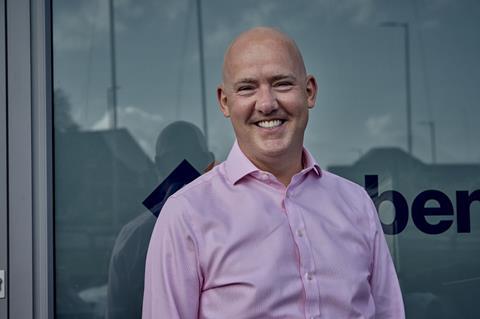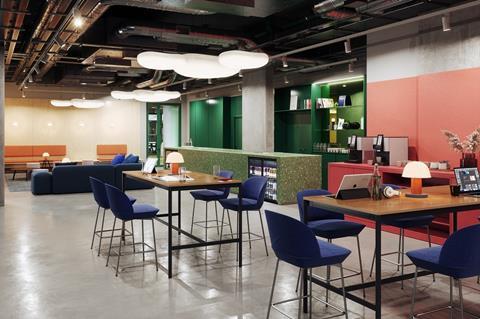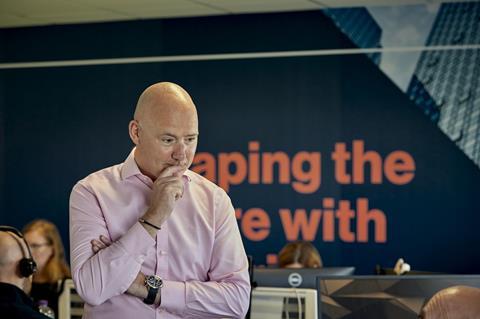Soben now operates in 35 countries and is aiming to become a £100m-turnover firm within five years. Founder Scott Smyth tells Carl Brown all about the firm’s strategy and journey to date

What happens when a small Scottish family business expands and goes international? For starters, individuals are replaced by larger professional departments.
“My wife was the first person I sacked, it was detrimental to our relationship,” jokes Scott Smyth, co-owner of Soben, the fastest growing consultancy in construction.
In reality – his wife Michelle was not really “sacked” and still co-owns the business with Scott – the company had merely outgrown its reliance on Michelle to provide book-keeping services, so instead it installed a proper corporate finance department. But this illustrates some of the dilemmas that Soben is now facing.
It may have started out as a small cost management consultant based near Glasgow but it is now growing at an astonishing rate, in large part due to its work on data centres at home and abroad for multinational firms. Last year it doubled its UK fee income from £4.5m to £9m, jumping 24 places to 92nd in Building’s annual Top 150 Consultants list, the biggest rankings rise and percentage increase in fee income seen by any consultant in the industry.
Its overall turnover is set to be around £18m this year and is projected to rise to £25m next – an annual increase of 38%. It now employs around 300 people internationally and has established offices in 12 countries, with activity in 35 altogether.
It has been a whirlwind expansion and the firm is not done yet, with ambitions of increasing turnover to £100m plus by 2028.
Smyth joins Building to reflect on the rapid growth and explain more about the firm. Looking laid back but smart in a black fleece, he describes Soben in its early years as like a “band that plays in the working men’s clubs to do its apprenticeship”, but then finds a “critical mass” [of support].
For Smyth, Soben is a cost, risk, project and schedule management consultancy that “helps blue-chip clients build their large, complex and-time critical projects with cost certainty”. But how did it get here?
Beginnings
The best way of explaining the Soben story is from the beginning, Smyth insists. “I wanted to get a degree, I wanted to be university educated and earn money and in Scotland at the time there were only two courses that would allow me to get a degree part-time,” he says.
“One was accountancy and one was quantity surveying – and my dad had a friend who was an accountant and he always thought it was quite boring, so I wanted to be a QS.”

Smyth later trained for around 10 years in consultancy before moving to work as a commercial manager for a contractor.
“What was apparent as a contractor’s QS was that you are working on wafer-thin margins,” he says. “So, your estimate has to be right, your procurement has to be right, and your risk management has to be right.
“You have to look at how you are commercially managing that project. If you fail in any of those things, then the project loses money – and I loved that.”
As time went on, however, Smyth came to feel that he could do a better job than the consultants he hired as a contractor. “I felt many of the consultants didn’t have that commerciality about them,” he says.
Scott Smyth CV
April 2011 - present Founder and co-owner, Soben
June 2003 - April 2011 Commercial manager, R&D Construction Group
January 2001 - June 2003 Senior quantity surveyor, Melville Dundas
October 1996 - January 2001 Quantity surveyor, East Ayshire Council
July 1991 - October 1996 Assistant quantity surveyor, Tozer Capita
When pushed as to what he means by this, he suggests that consultants could do more to look at efficiencies themselves earlier in the process in order to put a better offer before the client.
“Rather than the designer designing it, the consultant putting it out to the market and then the contractor looking at buildability efficiencies, why don’t we take that experience up to the client? And the client gets the benefits of phasing efficiencies, buildability efficiencies, looking at design, at the schedule, to bring that ‘contractor commerciality’ up the value chain to the end client.”
In 2011, partly as a result of his contractor employer Robison & Davidson going into administration, Smyth saw the opportunity to set up his own business with his wife Michelle. The family nature of the fledgling business was emphasised by the choice of “Soben” as the name, after their children Sophie and Ben.

Soben, began, naturally, as a regional firm and focused initially on work in the renewable energy sector and then statutory utility businesses including Scottish Power, SSE, British Gas and Northern Ireland electricity. Soben was providing pre- and post-contract support for contractors at this stage.
Expansion and data centres
In 2016, Soben expanded into the London market, turning around bills of quantities for general contractors and tier one contractors within a short timeframe. The firm landed work with Multiplex on the Royal Albert Docks redevelopment in east London and then worked for Lendlease on its £1bn Google headquarters scheme in King’s Cross.
“That [Google HQ] was the crown jewel in our portfolio. As soon as we mentioned to other prospective clients that that was one of the projects we were working on, all of a sudden we were taken seriously in the London market”
“That was the crown jewel in our portfolio. As soon as we mentioned to other prospective clients that that was one of the projects we were working on, all of a sudden we were taken seriously in the London market,” Smyth says.
It was not long before Soben was looking abroad. In 2021, one very well-known multinational company, looking at the firm’s services for data centre developments in the UK, offered Soben some work.

“That was where the real exponential growth started. We were working on massive projects, we did a good job for them in the US, and they said, ‘Can you help us in Mexico? Can you help us in Chile, Brazil’?”
In the space of 18 months Soben had opened offices in the US, Canada, Mexico, Brazil, Chile and Argentina. It has since secured work with other – what Smyth terms “hyperscale” – data centre developers including several multinationals that are household names.
Smyth says he is restricted from mentioning the names of these well-known companies because of restrictions in the non-disclosure agreements that Soben has signed.
Data centre work now accounts for around 60% of the firm’s revenue, with the remaining 40% divided between other areas including high-tech manufacturing, life sciences, pharmaceuticals, life sciences and utilities.
How Soben has grown
Smyth sees the data centre market as more stable and more likely to produce reliable growth than other markets such as residential or commercial. “The demand for cloud storage space doubles every three years,” he says.
“Add AI into the mix and that is creating a hockey stick of growth [in data centres] that is required to cope with the processing power needed to run ChatGPT and all the other applications that are in development right now.”
He reels off just some of the roles he sees for AI, including pharmaceutical research and development, automation of transport and management of energy networks.
“The demand for cloud storage space doubles every three years”
But surely there are risks with data centres as a market like any other? Smyth nods and says market capacity for labour, plant and materials to construct data centres could be a limiting factor.
However, he adds: “The biggest risk of all is access to power. You’ve got the traditional core markets in Virginia in the US, in Dublin and Frankfurt, but these traditional areas for data centres are becoming constrained by lack of power.”
Smyth therefore predicts the development of a secondary market, with AI campuses in more remote areas – perhaps in areas with more renewable energy, like his native Scotland for instance. That would represent a neat return to Soben’s roots.
Foregoing short-term profit
Smyth has formed an industry group to help encourage data centre developers to come over and locate in Scotland. But for all the revenue growth, international offices and its attempt to place itself as a thought leader in the data centre market, is Soben actually making a profit?
When pressed, Smyth admits that Soben is not currently making much of a profit due its push to invest for growth. He says it has an underlying Earnings Before Interest, Taxes, Depreciation and Amortisation (EBITDA) of around £1.8m.
However, when it comes to statutory pre-tax profit, he says the firm is “probably breaking even” as he is investing in growth and “the corporate backbone”, meaning the firm is strengthening its finance, HR, marketing and sales functions.

“It’s about investing for the long term. So, by 2028, I believe we have a market opportunity to get to £100m turnover,” he says, emphasising that Soben is in a “scale-up” phase in which he does not want to let short-term profitability concerns hold back growth.
Certainly “growth mindset” is a phrase that Smyth is fond of using and he has, through his leadership principles (see box below), set out the kind of attributes he wants from the people he employs.
“We have a leadership principle which says we employ people that are ambitious, that are humble, that are open to feedback and have a growth mindset… That’s a nice way of saying we have got a ‘no a***hole’ policy,” Smyth laughs.
When it comes to the wider policy environment for construction, he agrees with the Building the Future Commission’s recent call for more long-term strategic thinking from government.
“I want to prove to people I can create something really worthwhile and make a difference”
“The key thing I want from government is for it to be decisive… stop flip-flopping. If you flip-flop, then it generates a lack of trust… If contractors, consultants and designers are committing resource to a project, they have to know the government is going to continue to get behind it.”
After spending 45 minutes with Smyth, it is clear that he is a very driven and restless individual, always pushing for more. He suggests this comes from his father, who was entrepreneurial and hard-working and encouraged him to go to university.
“I would run home from school and say, ‘Dad, I got nine out of 10 in my maths test’. And he would say, ‘Why did you not get 10 out of 10?’.
“People ask me about why it is never enough, why I keep pushing for growth and growth and I think that might be it. I want to prove to people I can create something really worthwhile and make a difference.”
Soben may have only just broken into the top 100 consultants table, but the firm is growing rapidly. If it continues to ride the data centre boom and win more multinational contracts, it can only carry on rising up the rankings.
Soben’s leadership principles
- We always deliver on our promises, no matter how small. This builds trust and credibility.
- We have a bias for action. Actions make things happen. We must make careful decisions and have sound logic for these, but we recognise that we are not going to get it right all the time. When we get it wrong, we will correct the decision quickly and share the learnings.
- We are entrepreneurial and driven to solve the client’s problems and deliver service excellence as if paying our rent or mortgage depends on it.
- We have a business owner mentality to cost management. We will not have offices with crystal chandeliers and leather couches. We will invest our fee in our people to ensure we can deliver the best possible outcomes for our clients.
- We will reinvest a substantial percentage of our profits year on year to create a sustainable business for the long term.
- We will employ the best people who are ambitious, hard-working, humble and open to feedback. We will trust them to do their job and empower them to “proceed until apprehended”.
- We will be open, honest and direct in our communications. We will trust each other and know that we can debate and challenge decisions, recognising that we all strive to build a successful company. Once a decision is made, we will all get behind it and hold each other accountable to deliver.
- We will have a growth mindset. We do not know what we do not know. We maintain a curiosity and thirst for learning with the aim of getting better every day. We engage external help from successful and experienced individuals that will enable us to accelerate our success by learning from other peoples mistakes.
- We are a people business. We can bring our true self to work and we will be there to support each other, even during challenging times.



























No comments yet